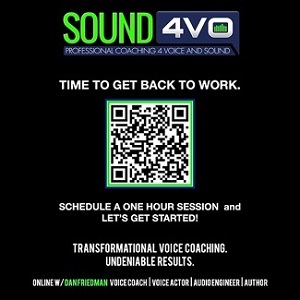|
VOICE ACTING Can You Get Through A 60-Sec VO Spot Without Stumbling? Tips For Fluent Reading ... October 9, 2015 By William Williams Voice Actor & Coach  Iíve been
teaching voice overs for 20 years, and every student begins with the same
declaration: "I can talk and I can read, so I can do this.Ē Iíve been
teaching voice overs for 20 years, and every student begins with the same
declaration: "I can talk and I can read, so I can do this.Ē One of the first things we discover is that half of these talents canít read. Now, I donít mean they read like in the first grade, "See Spot run. Run, Spot, Run.Ē I mean they canít get through a 60-second ad without stumbling on words, missing words or substituting words. Some aspire to read audiobooks in their career. Well, trust me, if you canít nail a 60-second spot, youíll never get through a 257,000-word Harry Potter book. WHY JOHNNY CAN'T READ Reading isnít as simple as you think it is.
So if you have trouble reading, here are some hints on how to identify your weaknesses and improve your skills. SYNCH YOUR EYES You learn to read by reading out loud. But very soon you learn to read to yourself. And you can read to yourself faster than you talk. So you may find your eyes are a racing rabbit and your mouth is crawling tortoise trying to keep up. Suddenly your brain says, "Where am I?!" To teach your eyes and speech to synchronize, try guiding your eyes by pointing to the text with your finger or a pencil tip. Keep it moving along as you read. Youíll find this keeps your eyes from jumping ahead. This will improve the flow of your reading with less stumbling. AUTOMATIC WORD READING You may think we sound out the letters when we talk. We do at first, but very quickly we just learn the shape of the letter combination and we process a word as a unit. Taht si wyh yuo cna udnersatnd tihs sentesne.But is takes practice to learn this automatic recognition of words. If you donít recognize a word, you have to pause to decode it. Or worse still, your mind may guess the intended meaning and just substitute any word that works. The more words you automatically recognize, the faster and more accurate your reading will be. To improve automatic reading you need to Ö read! More. A lot. Out loud. Donít worry about speed. Concentrate on accuracy. Start with simple material and then work toward widening your automatic vocabulary. The actual recognition of words should become unconscious behavior. If you donít have to concentrate on decoding the individual words, then you can allow your mind to pay attention to comprehension of the meaning of the words. WORD GROUPING AND PHRASING We also donít read individual words. Most languages group words together to enhance ideas. Adjectives connect with nouns, adverbs describe verbs. For example: The sentence, "The quick brown fox jumped over the lazy dogĒ really says "Fox jumped dog.Ē Ah, but itís:
Also, most sentences - especially in business copy or in advertising copy - are constructed from smaller, easy to read phrases. So the previous sentence becomes:
THEN ADD PROSODY Thereís a word you donít see every day. "ProsodyĒ is the linguistic term for the melody and variety in speech. Prosody includes changes in pitch, tone, stress and rhythm. Two important aspects of English are word stressing and sentence pitch direction. Word stress is so common we have a way of writing it with underlines, italics or bold type. And word stress adds additional meaning to a sentence. In "Tom is here,Ē Tom doesnít move, but where we think he is changes:
Remember that one kid in third grade who could make "The Cat in the HatĒ sound like Orson Wells or Katharine Hepburn reading the Old Testament? When all these reading skills come together you become what we call a Fluent Reader. And it is an ability you can acquire. So if youíre having trouble reading out loud, donít fret. Itís a skill you last worked on and practiced in elementary school. Look over this list of possible problems to identify your weakness and then practice to improve that aspect of your reading. Fluent reading will speed up your auditions and make your jobs easier. And it will give you more time to concentrate on your artistic interpretation of the copy. Then, who knows? Maybe you will book that Harry Potter job. And remember Ö keep talking! -------------------------- ABOUT WILLIAM William Williams has worked for the last quarter century as owner of Aliso Creek Productions. As a voice talent, he has voiced national, regional and local commercials for AT&T, Apple Computer, Radio Shack, Princess Cruises, Chicago Tribune and many more. He has directed Nancy Cartwright, Michael York, Yakov Smirnoff, Jack Mayberry and other top voice talent. And he teaches commercial and animation voice over, offers private coaching and demo production in his studio in Burbank, CA and online. Email: william@alisocreek.net Web: http://alisocreek.net |
|
|
Inspiring interviews help your VO career
Email alerts to new VoiceOverXtra articles
On Michael Langsner's Voice-Over Roadmap Podcast
With Sean Daeley and Paul Stefano - check it out!
As of the NEW website launch, 03/22/2012








.png)

Thanks for posting!